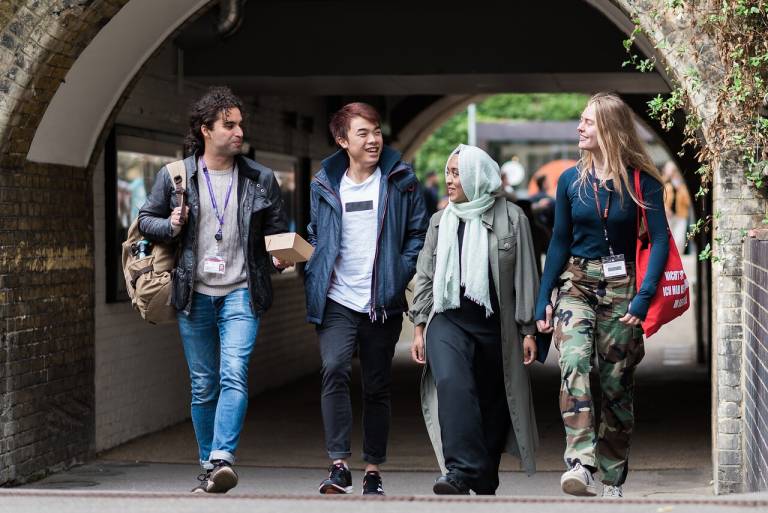Build new networks to support your university journey
14 November 2022
Building new networks is integral to your experience at university. UCL MPhil Philosophy student Dylan Ngan provides some tips for building your network.

When I embarked upon my university journey here at UCL, those steps were part of many firsts for me. It was my first time in London and the United Kingdom and marked the start of my university education. For many of you, university may encompass many new beginnings too – this may be the first time you’ve been this far away from home or living on your own. For others, you may have already settled in. At university, many of us will face many similar challenges and struggles, and therefore it is vital that we look after ourselves and our wellbeing. Hopefully, by sharing some of my experiences and some things that worked for me, it will help some of you ease the nerves and overcome any wobbles.
Coping with the workload
A common aspect of university life is the feeling of being overwhelmed by what can often seem like a significant amount of academic work. In an increasingly hectic world, with many tasks to get sometimes simultaneously, it is perfectly normal to feel slightly panicked or like things are slipping out of your control. To counter this, get organised – write down a list of the things you need to do and try to have a clear overview of what is priority and what needs to get done. Then schedule and allocate resources to the key events and set reminders.
Dividing a seemingly large workload into achievable or manageable pieces is also a great way regaining composure, focus, and control. Diving the workload into smaller tasks with priorities, can often make them more manageable. You may find developing a system of getting your tasks done on time a good practice and this can prove immensely useful not only in the first few weeks of settling into university life, but also as you progress with your studies.
Familiarise yourself with your surroundings
I find exploring and finding one’s bearings in a new or otherwise familiar environment to be a comforting grounding exercise. As we settle into university life, it is worth spending some time locating places that will become part of your weekly routine. For instance, getting to know where your local supermarkets, stationary and local charity shops are located and finding out which offer the best deals is very useful. Or, exploring the neighborhood and finding out what local coffee shops, bakeries, or pubs are nearby can help when you need to unwind. For students suffering homesickness, it helps finding out where it is possible to get a taste of home. It occurred to me quite early on at university that while experiencing new cuisines and cultures are an essential part of settling in, from time to time, it helps to indulge in a little nostalgic gustatory trip down our memory lanes.
Find your balance
A big part of immersing yourself and maintaining our wellbeing during university life is finding a sense of balance and stability. Try to establish habits or routines that help you get comfortable with day-to-day life as well as your environment. For example, try to do chores or your shopping, on set days every week. Cooking your own meals can help you to eat healthy and can have added therapeutic benefits – it can help bring a sense of calm or help connect you with others. And it can help you save money especially with inflation and the rising cost of living. You can also rearrange your desk or living area, re-decorate, and even reorganise your wardrobe to help you restore your sense of calm. Maybe this will help you find a more efficient way to do things, or maybe it is just about building an atmosphere that expresses your identity. The point is that it should give you joy and relaxation. Remember and be mindful that these things are meant to be working for you, they should enhance your life, not bring you down.
Find new friends and build new networks
Perhaps the biggest challenge many students face is being away from home – from the family, friends and supporting networks that they are familiar with. A part of what we miss is the inherent atmosphere of being in a shared space of activity, an unspoken bond of a similar culture, language, and identity. Feelings of dislocation and loneliness can result from being in a new environment and around new people and having to learn and adapt to new things can create uncertainty and feelings of inadequacy. The unfamiliarity and feeling that things are not quite right or what we are used to are all signs of being homesick. For me a combination of two things helped. One, was remaining in touch with friends and family back home and being in a new place helped me find a deeper appreciation for those I love and care about. The second was building new supporting networks. You will make new friends, some in situations like what you are experiencing, while others may already call this place ‘home’. These new acquaintances and friends can share your journey with you and help support you with settling in and dealing with challenging times and situations – i.e., when you are having a ‘wobble’. Embrace the new experience and the new networks. New people, unfamiliar and even uncomfortable at first, can help you adjust and grow. At the end of the day, we are all trying our best in this new chapter in our lives. With each other, together, we will be okay.
How UCL Student Support and Wellbeing can help
If you need support, make an appointment with one of our caring advisers, or, if you are living in UCL managed accommodations, speak to one of our friendly student residence advisers.
Dylan Ngan, UCL Final Year MPhil Philosophy Student
 Close
Close

